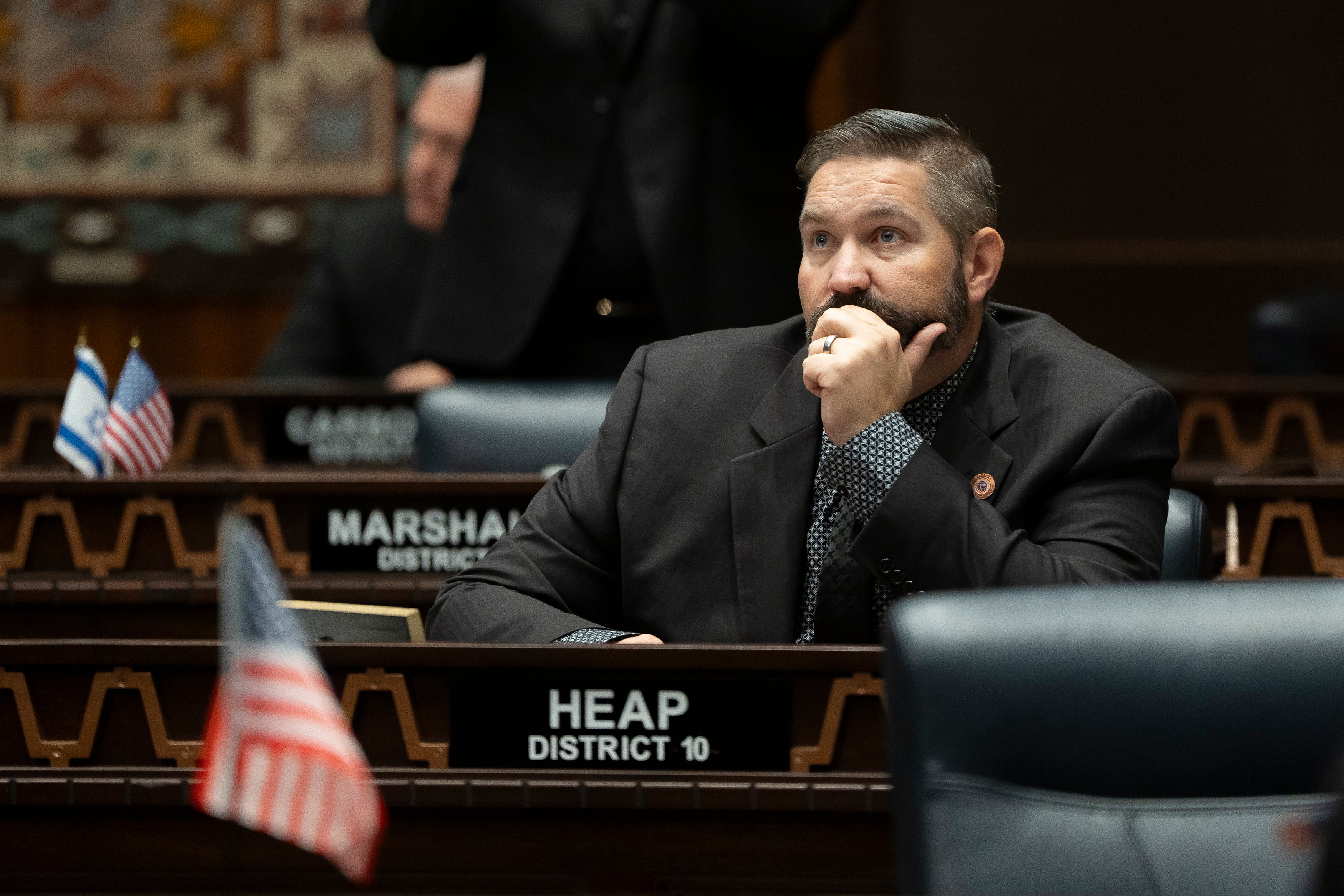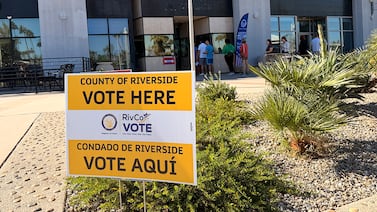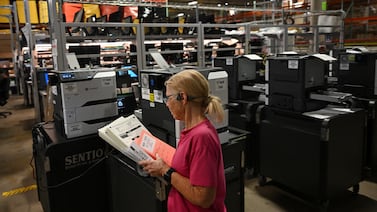Votebeat is a nonprofit news organization reporting on voting access and election administration across the U.S. Sign up for Votebeat Arizona’s free newsletter here.
A new crew of Republican politicians will soon take control of Maricopa County’s high-profile elections, a major change for a key swing county that has for years contended with unproven claims of widespread voter fraud.
The outgoing Republican officials built national profiles for fiercely defending the county’s elections against critics within their party. But the newcomers — also all Republicans — have signaled a different approach, saying they will be looking for ways to improve the system.
The incoming recorder, Justin Heap, in particular, has been a consistent critic of the county’s elections, and is pushing for major changes. Heap, currently a Republican state representative, defeated incumbent Recorder Stephen Richer in the primary and went on to win the general election in a race that drew national attention.
Heap has said he has doubts about the fairness and security of the county’s elections, called the county’s system a “laughingstock,” and promised voters he would overhaul things. But he splits control over the county’s elections with the five-member board of supervisors, and in interviews with Votebeat, the incoming board members said they plan a measured approach to any changes.
On the board of supervisors, Mark Stewart, currently a councilman in Chandler, will replace current Chairman Jack Sellers. Incumbents Clint Hickman and Bill Gates both declined to run for another term and will be replaced by U.S. Rep. Debbie Lesko and former state Sen. Kate Brophy McGee.
The new term begins Jan. 1.
The starkest shift may ultimately be to the county’s united front when it comes to messaging and tone. County officials have banded together since the 2020 election to issue swift and uniform responses to false claims and criticism, an approach the officials felt helped voter confidence. Now, the new officials themselves will be the ones asking questions — and must build trust with each other while responding to distrust from voters.
Incoming supervisors also hope to rebuild the county’s relationship with the state Legislature, which fell apart after the 2020 election when lawmakers sued to get the county’s ballots to conduct their own audit.
A focus on speeding up election results
As recorder, Heap will control voter registration, voter roll maintenance, and certain aspects of early voting. His team will mail out early ballots, and verify voter signatures on returned early ballots. But once the signatures are verified, the supervisors take it from there.
The supervisors control in-person voting, seasonal hiring, technology, ballot processing, and ballot counting.
Heap didn’t respond to multiple requests for an interview for this story, but in a recent radio interview on KTAR, he said he will be weighing changes to staffing, to how the voter rolls are cleaned, and to how mail ballots are tracked and kept secure.
“The people have clearly spoken,” he said in the KTAR interview. “They demand change to elections that we haven’t had in quite a while, and I’m looking forward to getting into office.”
Heap also emphasized that he wants to speed up the production of final election results. But he won’t have much control over that. He can make changes to how quickly his team verifies mail ballot signatures, but ballot processing and counting is controlled by the supervisors.
That said, the majority of the new board said in interviews that they, too, want to try to find ways to speed up the process.
Lesko, Brophy McGee, and Stewart all said separately that they have begun to try to learn more about how the county’s elections currently work, in order to see what’s working and what isn’t. The two supervisors who won reelection, Republican Thomas Galvin and Democrat Steve Gallardo, said in interviews that they’re optimistic about how their new colleagues will oversee the process.
Asked about whether they trust the county’s elections now, the new members offered varying answers.
“I’m going to see what has gone right, and what has gone wrong,” Lesko said, adding that she believes there’s room for changes “to make it better,” though she wasn’t specific.
Brophy McGee, on the other hand, said she believes that “past elections have been fair.”
“But it takes too long to get the results,” she said, and she believes that lengthy results timeline contributes to public distrust.
Stewart said in an interview after his primary election win that the courts have proven there was no widespread fraud in the state’s elections. But during the campaign, he criticized Maricopa County for its technical problems during the 2022 election, and he said that he did not believe that election was fair to the voters who had to wait in long lines because of the problems.
He said the polarization of party politics is “frustrating everybody” and he wants to get back to a place where everyone can communicate with one another.
As former state lawmakers, Brophy McGee and Lesko said they believe that they can leverage their existing relationships to improve supervisors’ relations with state lawmakers.
The first idea they want to collaborate with the legislature about, they said, is speeding up election results.
Divvying up election duties
State law divides election duties between the recorder and supervisors, and they have a shared services agreement that outlines their roles in more detail.
Supervisors had, for decades, delegated more authority to the recorder’s office but have repeatedly revised the agreement to take back control. Gates said the agreement, at this point, is closely aligned with state statutes. If supervisors change it so it isn’t, he said, “I think you kind of do it at your peril unless you have really good reasons for it.”
The current board of supervisors decided to again take direct control over areas where state law grants them authority in part because, when mistakes occurred, they were held responsible anyway. Hickman said if the new supervisors again delegate duties to the recorder, it’s still “going to be their butt on the fire.”
The latest change to the agreement came in October, just before the election, when Richer and the supervisors agreed the recorder would no longer control the information technology division or ballot processing. Hickman said supervisors wanted to exercise direct oversight over the IT office in the wake of a few different problems, including the ballot printing errors in 2022.
Heap said in the KTAR interview that it was “shortsighted” for the “lame-duck board” to sign this new agreement.
“I’m already talking to the incoming board members, and one of the first things that we will do is work on a new agreement that makes more sense,” he said, though it isn’t clear exactly what he would propose changing.
Lesko and Stewart confirmed separately that they had spoken to Heap, and that they are open to revising the agreement. Lesko said that she talked to county staff, and they told her that it’s normal for new recorders and supervisors to reopen such agreements.
Gallardo and Galvin said they support keeping the current agreement. The days of having the recorder in control of functions beyond those specifically laid out in state law, Galvin said, are “a bygone era.”
What does Heap want to do?
Heap’s record in the state Legislature over the last two years provides hints to his priorities.
Heap introduced bills that, for example, would have required recorders to keep additional documentation tracking each ballot all the way through the system, from the time it is printed to the time it is cast. The bill didn’t pass, but as recorder, he could change the way Maricopa County’s ballots are tracked.
State Rep. Cesar Aguilar, a Democrat who served with Heap on the municipal oversight and elections committee this year, said some of Heap’s positions concerned him. This includes when Heap pushed to eliminate early voting and voting by mail, saying that’s what his constituents wanted.
Heap told KTAR that he recognizes he is “not going to have the power to simply end mail-in voting, nor would I do that right off the bat if I did.” But he said that he wants to make changes to ensure the county is securely handling early ballots.
During his campaign, Heap accused Richer of failing to clean people who have moved from the voter rolls, saying during a primary debate that hundreds of voters had told him they are receiving mail ballots for people who don’t live at their address. And in his interview with KTAR, he said the first job of all recorders in the new year is to ensure that “we only have lawful citizens on our voter rolls,” because of the recent revelation that the state hasn’t collected proof of citizenship from a select group of longtime residents on the voter rolls.
But he has not specified what he would do differently, and both state and federal law limit when and why voters may be removed from the rolls.
Tom Ryan, a Democratic election attorney, said that Heap’s policies will be subject to scrutiny from the county attorney’s office.
“For any kind of stupid move where he tries to violate the law, buena suerte,” Ryan said, which means “good luck” in Spanish.
During his campaign, Heap also signaled that he’ll push for personnel changes, saying many current employees were “hired under the radical Democrat Adrian Fontes,” a former Maricopa recorder who is now secretary of state, and describing others as career bureaucrats.
But after the election, he told KTAR that he’s “not planning to come in and clean house or anything.”
“We need to make sure we have the right people in the right spots,” he said.
Jen Fifield is a reporter for Votebeat based in Arizona. Contact Jen at jfifield@votebeat.org.






